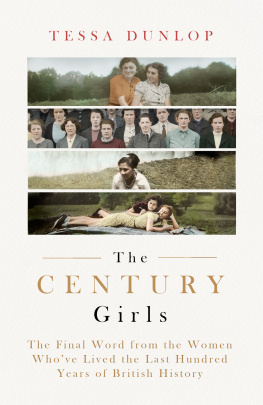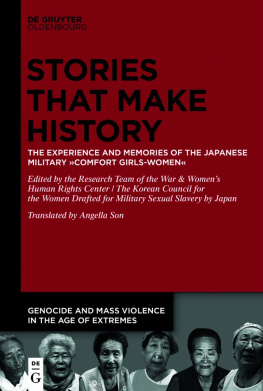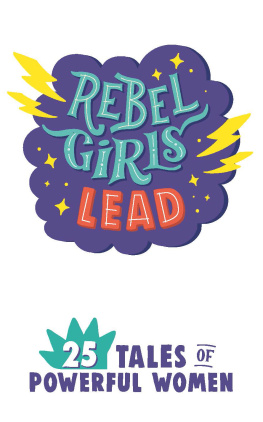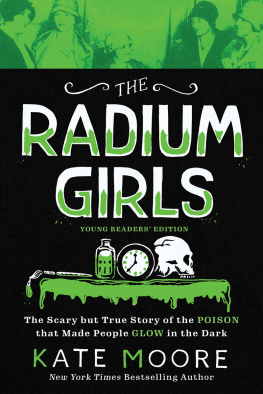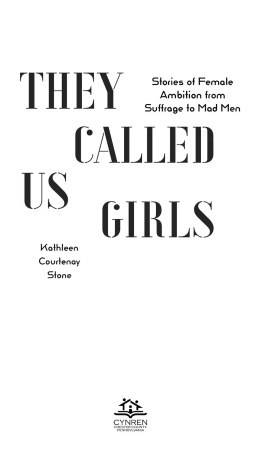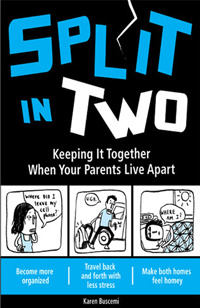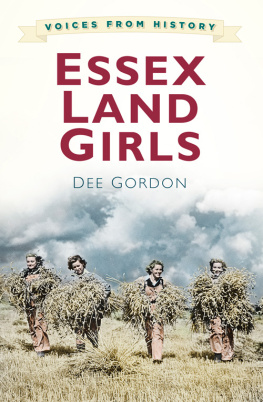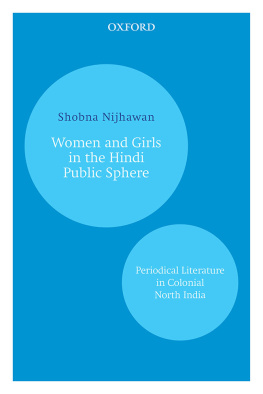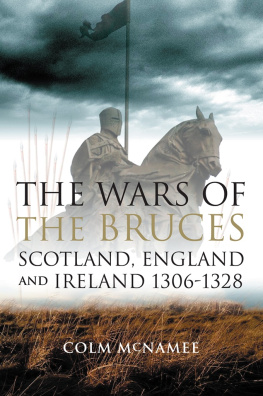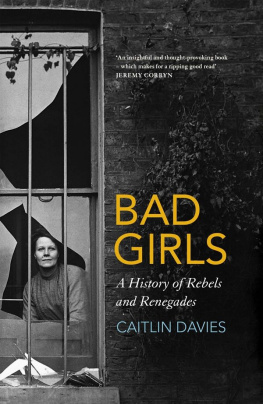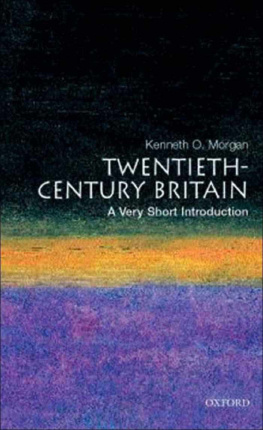In memory of Bernard
I NTRODUCTION
Youre as young as you feel, surely?
Its a pity, but yes, dats right! At 102, Olive inverts my clich and laughs loudly. She is surrounded by the paraphernalia of old age: walking frames, pill pots, pads and plasters, dusty corners and disinfectant. Assistance is required to get dressed and go to bed. Carers drop in three times a day, they comb and plait her hair, cut her nails, wash her body and prepare her food. Captive in a reclining chair, physically Olive feels old. She cant just get up and go there is no spontaneity any more. A room full of astonishing dresses, sequins, fur and frocks groans overhead; the clothes tell a story of one hundred years. That story is ongoing but Olive can no longer mount the stairs to reach her glittering wardrobe she has to wait and hope.
When company eventually arrives Olive is transformed; she feasts upon it, slaking her thirst and sitting upright for more down come the dresses and out pour the stories. She berates me for not visiting sooner: You playin away, you cheatin on me, eh? And there are anecdotes about the doctor who still flirts with her, and St Georges Church, where shes the star of the show. Olive dips between time zones and continents; childhood and adolescence flash past until we arrive sooner or later in 1950s London. It was a very unusual relationship! There is nothing Olive loves more than talking about her late husband, Trinidadian Ray Gordon, whom she met on her first night in the Mother Countrys metropolis. Shes right, the story is complicated, as was the era. A black woman from British Guiana, theres nothing straightforward about Olives life in postwar England. She shakes her head, this is not the time for questions; it is imperative I understand the intensity with which Ray once loved her I was his illustrious wife! and that in the end, Yes, I cant tell it otherwise, Ive had a wonderful life. In these moments, Olive is no longer old, she is travelling down a highway of cherry-picked memories, once again a woman in her prime, a player, a beauty, a survivor. She has edited (and re-edited) her Great British century; the highlights are her gift to subsequent generations.
As the scribe, I take what I can get. Olive has no interest in delivering a neat thesis on empire, migration, colour, politics or change over the last century. She wants to tell her story of her life, around which I am permitted to extrapolate historical parallels and analysis. I can ask questions, but if Olive isnt interested she shrugs and doesnt answer. One of the first women I met when researching this book, she taught me much about how memory works. I adapted the shape of the unfolding narrative accordingly. This story is the history of six women who have lived one hundred years, specifically the years that followed the political enfranchisement of British women aged thirty and over in 1918. Like so many historical watersheds, that date has provided the raison dtre for a far richer, more nuanced history.
The story spans more than ten decades (the youngest Century Girl was born in 1918), but in the retelling of their lives those decades are rarely accorded equal importance. During our numerous meetings and interviews, Prime Minister Tony Blair and his new dawn, which claimed the womens ninth decade, was not touched upon by any one of them. The recent past is tainted with todays contemporary agenda, and (perhaps more importantly) it is not exclusively their past. When I mentioned Margaret Thatcher (she was a woman after all), I invariably met reluctance, even resistance. Generally, the further back in time, the more vivid the memories and the more willing the storyteller. They are called formative years for a reason. Napolon Bonaparte famously declared, To understand the man you have to know what was happening in the world when he was twenty. Given the political, social and legal restrictions placed upon women at the beginning of the twentieth century, that supposition works even better when applied to girls born during the First World War; these were young women who came of age when the political tumult of W. H. Audens low dishonest decade approached its grisly climax.
There are exceptions. Olives desire to focus her story predominantly in the 1950s is unusual for a woman born in 1915, but understandable. Those first challenging years in London decided the rest of her life. Nor will everyone admit to having a defining moment or epoch. Joyce is an academic; to gain access to the revered world she inhabits I gave a lecture at her former Oxford college. In return, the Principal of Somerville wrote to her most senior alumna and asked if Joyce would grant me a hearing. Dr J. M. Reynolds has been engaged in the pursuit of learning most of her life; an honorary fellow at Newnham College, Cambridge, Joyce is still working, with a reputation to maintain it has always been thus. She resists the suggestion that she belongs to one particular era but does concede that perhaps how one arrives at a destination is the most interesting bit. Following Napolons benchmark, at twenty she was already at Oxford University and would defy the odds to emerge, mid-World War Two, with a first-class Classics degree. An achievement which set her up for life. However, she is clear that today, what I do now, I dont consider it a diminishment, its just as important as it has always been. Only I do get very tired. Whatever her protestations, Joyces manners, her speech, even her style belong to another era. To sit and listen to her trained, resonant voice is an evocative delight, made all the more extraordinary when she expounds a broad sweep of liberal views.
Joyce was born in 1918, a month after the First World Wars November armistice. She is the product of a distant, very different world and yet in conversation many of her opinions are contemporary. I suppose I have always worked with students and in that respect I was part of the change that was taking place. I find young people interesting. A fascinating blend of old and new, Joyce has been an astute guide; a witness to decades of incremental social progress, she didnt need to be part of a new world to understand it. And yet she chides me when I take a generalisation too far, or get overexcited about modernisation. We cannot rely on progress. Most certainly not! Joyce has studied the rise and fall of empires; she is also a woman who has lived through the gradual flowering of free tertiary education and its subsequent decline. Dr Reynolds has been at university a very long time.
Perhaps the best of us never stop learning. An enthusiastic correspondent, in our first written exchange centenarian Helena Jones explained, I am going to a monthly political meeting tonight and its poetry club tomorrow night! Four weeks later, bent double (surely in constant pain?), she walks out of her little home in Brecon to welcome my arrival in a swirl of snow. Well! We havent had proper snow in this part of Wales for four years. Its global warming, you see. Helena was recommended by a loyal member of Powys Brecon Womens Institute. In 2015, the year I started my research for this book, the Welsh WI enjoyed its own centenary celebrations. (The first UK meeting had been held in Anglesey one hundred years earlier.) A century on and two sentences in a newsletter asking for women born in 1918 or before left me fielding calls and emails for over a week. Seven women got in contact, each proudly informing me of their very own Welsh centenarian. The numbers belied a larger trend. There are approximately 14,000 people over a hundred alive today in Britain; the figures are unprecedented. The Department of Work and Pensions, which oversees the administration of the Queens birthday cards, now employs a seven-strong centenarian team just to keep track of the nations oldest subjects. Meanwhile, I quickly realised that living for one hundred years wasnt enough to qualify as a Century Girl. In Wrexham, a miners wife was still going at 104 years old, but her daughter admitted, I suppose Mums a bit forgetful now and again; a Scottish centenarian nurse who married a Cardiff GP was introduced to me by a proud neighbour, but she confessed, Im quite a private person, so it might not be for me; and I received a hopeful email about a very old department store sales assistant, who, on further research, wouldnt manage to talk for longer than an hour. (Being one hundred takes it out of you.) And then there was Helena Jones.

